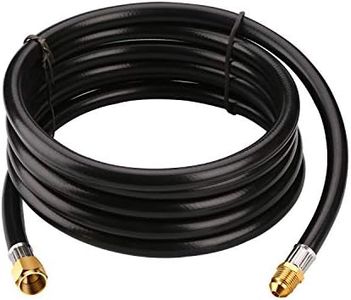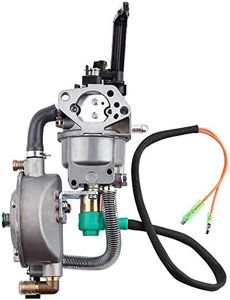We Use CookiesWe use cookies to enhance the security, performance,
functionality and for analytical and promotional activities. By continuing to browse this site you
are agreeing to our privacy policy
2 Best Propane Generators
From leading brands and best sellers available on the web.By clicking on a link to a third party's website, log data is shared with that third party.
Buying Guide for the Best Propane Generators
Choosing the right propane generator can make a big difference in how comfortably and safely you can power your home, job site, or camping setup during outages or off-grid situations. With so many models available, it’s important to pay attention to key specifications and think about where and how you’ll use your generator. Understanding these important features will help you match your true power needs with the right product for your lifestyle.Wattage (Running and Starting)Wattage tells you how much power a generator can provide. There are two types: running (continuous) wattage and starting (peak) wattage. Running wattage is what the generator can deliver over a long time, while starting wattage is a temporary boost needed for devices that draw more power when turning on, like refrigerators or power tools. Generators can range from small models around 1,000 watts to large units offering 10,000 watts or more. If you plan to run just a few small appliances or lights, lower wattage may be enough. For entire home backup or heavy equipment, you’ll need higher wattages. List out what you want to power and total up their wattage needs to guide your choice.
Fuel Tank Size and RuntimeFuel tank size determines how long a generator can run before needing a refill. Larger tanks hold more propane, allowing longer operation. This is often measured in hours at a specific load (like 50% capacity). Some compact models offer runtimes of a few hours, while larger units can run 8-12 hours or more on a single tank. If you’re using the generator for short bursts, tank size may not matter as much. For overnight or extended outages, a bigger tank and longer runtime are more convenient and reduce the need for frequent refueling.
PortabilityPortability refers to how easy it is to move and set up the generator. Smaller, lighter models may have built-in handles, while bigger generators often come with wheels and frames for easier transport. If you need backup power for home use and don’t plan to move the generator much, portability is less critical. For RV travel, camping, or job sites, a lightweight and compact generator will be much easier to handle.
Noise LevelNoise level is measured in decibels (dB) and tells you how loud the generator gets during operation. Propane generators can range from very quiet (around 50-60 dB) to quite loud (above 70 dB), which can be disruptive. Quieter models are ideal for camping, RVing, or neighborhood use where noise regulations may apply. If the generator will be placed far from living or working areas, noise level may not be as important.
Outlets and CompatibilityGenerators come with different types and numbers of outlets, allowing you to plug in various devices directly. Look for standard household outlets, RV-style outlets, and specialized ports for heavy-duty equipment. More and varied outlets make it easier to connect what you need without extra adapters. Think about the devices you’ll want to power at once; if you need to run both a fridge and high-powered tools, you’ll want a generator with suitable outlets for all.
Electric Start vs. Recoil StartGenerators may have electric (push-button) start or manual (pull-cord/recoil) starting systems. Electric start provides extra convenience, especially for those who may find pull cords difficult to use. Manual start generators are usually lighter and simpler, which can be fine if you’re comfortable with the method. If accessibility and ease are important to you, choose electric start; for simplicity, manual start might be your best option.
Propane Consumption RateThe propane consumption rate tells you how much fuel the generator uses per hour at various loads. Lower consumption means your tank lasts longer. Lighter loads use less propane, while pushing the generator near its maximum output will burn fuel faster. Consider what appliances you’ll use most often and how long you’ll need to run them—this can help you judge if a more efficient model will save you hassle with fuel supply.
Transfer Switch CompatibilityIf you’re buying a generator for home backup, transfer switch compatibility allows you to safely connect the generator to your home’s electrical panel. Some generators come ready for this, while others may need an adapter or additional equipment. Transfer switches make it simple to power essential circuits without running extension cords everywhere. If backup power for your house is your main goal, make sure your generator can work with a transfer switch.


